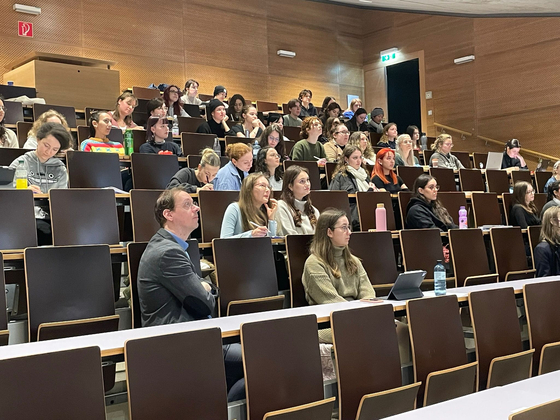Jerome de Wit, head of the Korean Studies department at Vienna University in Austria, is seen in the far left front row with students of the department in a guest lecture on campus on Nov. 14. [UNIVERSITAT WIEN]
VIENNA, Austria — There is more to the K-pop glamour that draws hundreds of students every year to the Korean studies department at Vienna University in Austria, said Jerome de Wit, the head of the department. “There is value in K-pop and Korean culture especially for teenagers in the country, who are from eastern Europe, northern Europe, western Europe, as well as from the Middle East and other regions, because they are able to find their identity and a stable footing in the culture,” De Wit told the Korea JoongAng Daily recently from the campus located in the center of Vienna. Austria, a landlocked country in Europe sharing borders with eight countries, has 17.1 percent of its 8.9 million population represented by foreign citizens. Its residents with any migration background in their previous generation stand at 25.4 percent, according to state records.
The fact that many of the K-pop acts are recruiting more non-Korean members has also helped their popularity. “The positive image also comes from the fact that more group members are from different nationalities and cultures,” he said. “That connects with the ongoing discussions in Europe about our identity and questions about how we can integrate more, beyond the borders.” Having taken up his doctoral studies on Korea at Leiden University in the Netherlands, which boasts one of the largest Korean studies departments in Europe, and Sungkyunkwan University in Korea, De Wit sees a different future for the boom in Korean studies in Europe, unlike that of other regional studies. The following are excerpts from the interview, edited for clarity and brevity.
Korean studies students of Vienna University take part in a special lecture on Korean culture with Jeong Yo-rang and make traditional Korean fans together in May. [UNIVERSITAT WIEN]
Q.
As a scholar of Korean studies for nearly two decades, how do you gauge the current student interest in Korea? Where is it coming from?
A.
K-pop has really taken hold of the youth culture in European countries. If you are a teenager, you try to search for your own identity, and in Europe, this happens through music. The type of music that you like is [the basis for] the group of friends that you are building. And K-pop has really become one of the genres around which students are gathering, finding interest and seeing themselves as being able to establish their own identity through it. Also, the youth, they’re really looking at the lyrics of these songs. When I ask my students what they like about K-pop, the answer is rarely because a member looks very handsome. It’s almost always about the message that these groups are portraying with their music.

